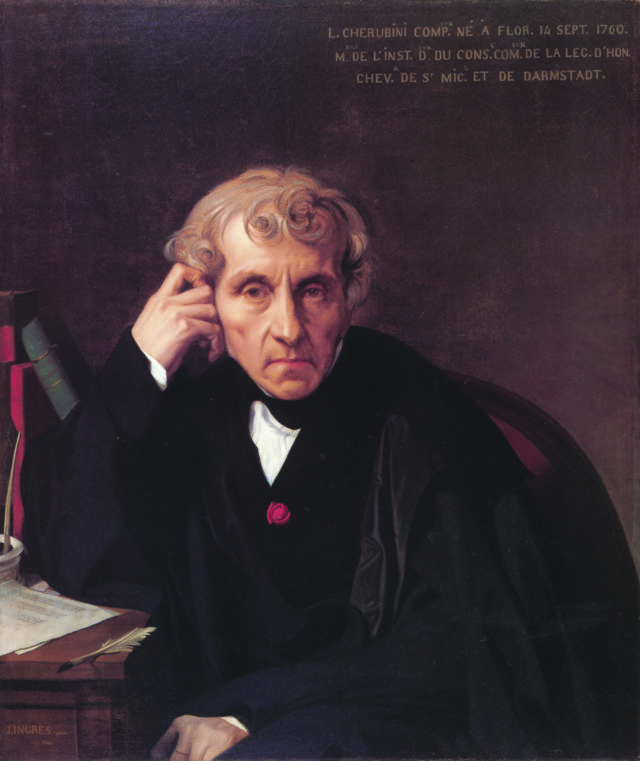
Maria Luigi Carlo Zenobio Salvatore Cherubini just may be the most influential classical composer you have never heard of.
As director of the Paris Conservatoire for 20 years (1822-42) and author of an important textbook on counterpoint, he influenced a generation of younger musicians. His many operas and his church works were widely performed and admired in his lifetime.
In particular his Requiem in C minor — which will be performed Saturday, Feb. 15, by the Boulder Chamber Orchestra and Boulder Chamber Choir — was admired by Beethoven, who asked that it be performed at his funeral.
“It’s a beautiful, beautiful piece,” says Vicki Burrichter, director of the Boulder Chamber Choir who is preparing the chorus for the performance. “Cherubini’s really extraordinary and was admired by Beethoven and Schumann and Brahms. I think he should be performed a lot more often.”
Bahman Saless, the conductor of the Boulder Chamber Orchestra who will lead the performance, agrees. He writes by email from Prague, where he is traveling as a conductor, “What I would like our audience to take away from this concert is that there were many contemporaries of Beethoven and Mozart who were overshadowed by the presence of these titans. Some of them deserve some light to shine on them.”
For the Boulder Chamber Orchestra, the selection of the Cherubini Requiem was partly practical because the ensemble is not large enough to perform larger scale works including the Brahms German Requiem or the Verdi Requiem. “We have had so much success performing Mozart’s Requiem, and to me the marriage between orchestra and choir in many ways is the perfect union,” Saless writes.
“I was very curious what other pieces are out there that would fit the stage that we perform on. Additionally our mission has always been to bring little gems in music into our audience’s ears. After listening to this piece I recommended it to Vicki [Burrichter] and she was very enthusiastic about performing it.”
The Requiem was first performed in 1817 for a mass in memory of King Louis XVI, who was executed at the height of the French Revolution in 1793. It is a unique work in that it is for chorus only, with no soloists. “It is highly unusual not to have soloists in a Requiem,” Burrichter says. “I can’t even think of another one.”
For Burrichter, that is more of a feature than a shortcoming. “It is a fantastic opportunity for the chorus to do everything with the orchestra and have that opportunity to shine,” she says. “And a chorus can do anything, right? I’m sort of joking but not really.”
Cherubini wrote for the chorus to provide the contrast and lyrical moments that soloists often create in large choral works. For example, the Dies Irae (“Day of wrath”) movement has one of the most dramatic texts of all choral music. That movement, Burrichter says, “is extremely dramatic, as only a big chorus can do, and then there are sections where he puts just the men or just the women singing these long beautiful solo-type lines.”
Elsewhere, “There’s a lot of contrast. There are movements like the opening Kyrie that is mostly pianissimo and piano and very, very hushed, very moving. So there’s a lot of drama in this piece,” she says.
That is the other aspect of the Requiem that Burrichter finds compelling: it reflects the composer’s operatic sense of drama. Cherubini was, from the beginning, a very successful opera composer.
“It’s got a real story, and he’s a dramatic storyteller,” she says. “That comes through very clearly, which is very exciting. This is what we love about Italian opera, so if you love Italian opera, you will love the Cherubini.”
Written in 1817, the Requiem falls in between the restrained classical style of Haydn and Mozart and the more emotional 19th-century Romantic style, and it can be performed either way, with large, powerful Romantic forces or a small, transparent Classical ensembles. “Because this is a chamber orchestra and chamber choir of around 35 singers, we’re heading more toward the classical style of performance,” Burrichter says.
“Then we’re going to put in elements of the Romantic period, with big drama in the movements where it fits. We’re coming up with our own interpretation out of that.”
She sees the Cherubini score in the context of other dramatic settings of the Requiem. “I think that the piece has resonances with all of those [other works] — the Mozart Requiem, the Verdi Requiem, the Brahms Requiem. If an audience member loves any of those pieces, then this is a piece that they should hear, because it’s going to become their new favorite Requiem.
“I can guarantee that.”
ON THE BILL: Luigi Cherubini: Requiem in C minor, presented by Boulder Chamber Orchestra with the Boulder Chamber Chorale. 7:30 p.m. Saturday, Feb. 15, First United Methodist Church, 1421 Spruce St., Boulder, boulderchamberorchestra.com














